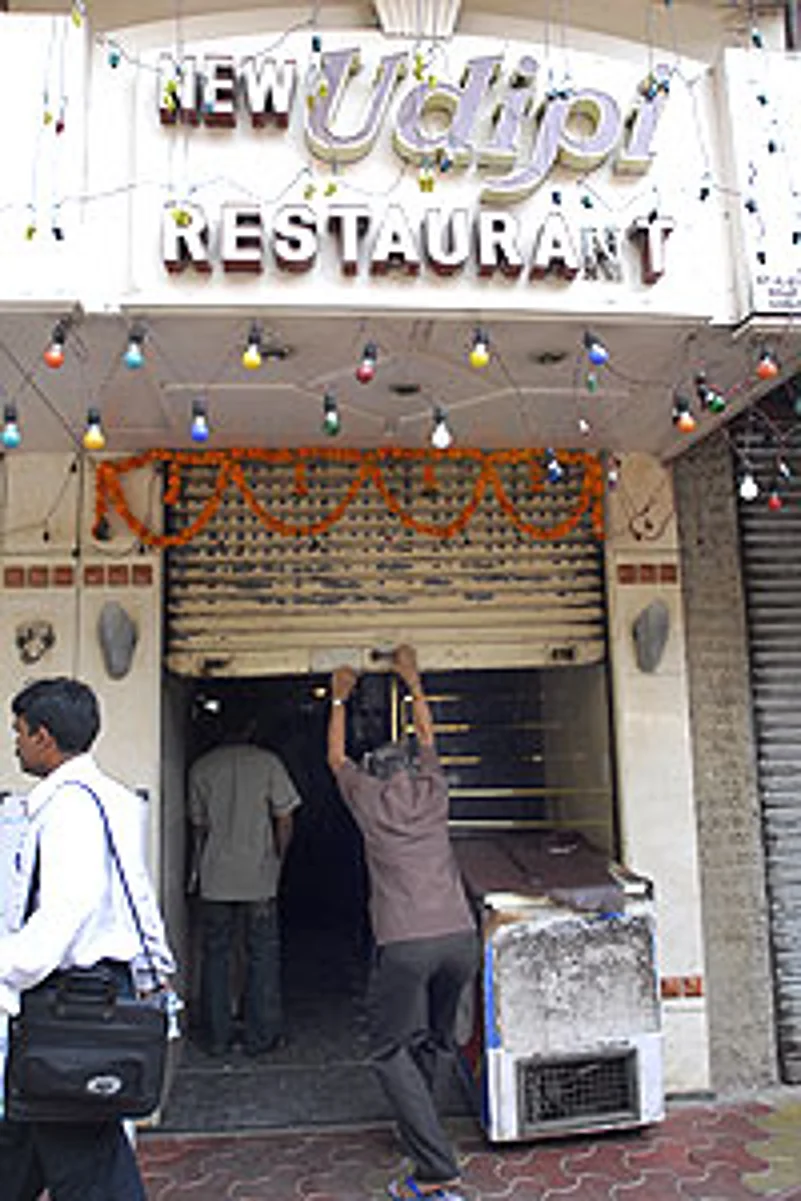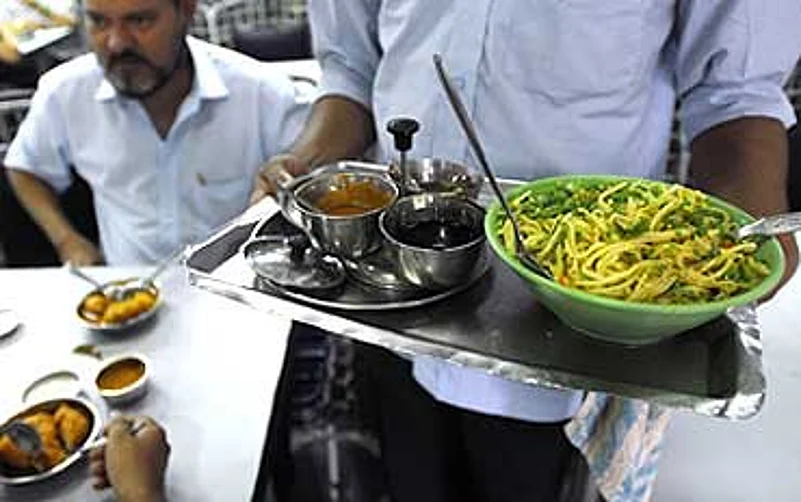- Rising rents, overheads, VAT
- Staff shortages. Fewer migrants to Mumbai from Karnataka because job opportunities are better at home.
- Changing tastes. Many customers now prefer the A/C fast-food joints.
- Original clientele in south Bombay, tempted by rising real-estate prices, has moved to the suburbs
- Bank automation, online trading facilities means the client base in the business district has shrunk
***

| A new Udipi restaurant downs shutters |
All this apart, VAT has been the final blow. In the early days, Udipi eateries, like all other restaurants, were subject to only 1 per cent tax if their annual turnover was Rs 6 lakh or less. The revised tax structure now presents only two alternatives: either an 8 per cent tax to be borne by the restaurant, or a 12.5 per cent tax passed on to the customer. The latter option has pushed up prices on Udipi menus. So, in the last few years, much-needed business has been lost to street food, which might be low on hygiene, but is easy on the wallet.
"The man standing over the dosa tava waiting for an order to come in is paid about Rs 120 a day," explains Satish. "I spend about Rs 28 for 1,000 litres of water. I have 38 clearances to manage every year. A single dosa costs me Rs 30 to make, yet the vendor across the street from me sells it for 10 bucks. How can I match that?"
It doesn't help that for south Bombay's oldest Udipi eateries, their most loyal clientele have simply moved away. Tempted by skyrocketing real estate prices, middle-class families in the area were the first to sell out to corporate offices and move to the suburbs. Over the last couple of years, small- and mid-size offices have followed suit, relocating northward. As bank operations have became automated, workplaces that once employed up to 100 people now run on skeletal staff. With online trading facilities, the busy brokers of Dalal Street who used to nip in for a quick idli now work from home. "Five of the city's biggest stockbrokers worked in our building," recalls Dr Shetty wistfully. "Each of their offices employed no less than 100 workers. Whether the market was up or down, they ate."

Chow mein is slowly elbowing out idlis at Vishwashanti restaurant in Mumbai
Those offices bear the look of a ghost town now, as do the Udipi eateries that used to feed them. Where bankers and government officers once came in as early as 7 am for a regular breakfast of upma, sheera and filter coffee, and then returned for lunch, now there are mainly taxi drivers trickling in and getting by on just a cup of tea.
"It used to be all about the food," says Nikhil Shetty, owner of Vishwashanti, an Udipi restaurant near Victoria Terminus. "A customer came in to eat, not to enjoy the ambience. But the younger generation wants fast food at hip places, and they're the ones with the money these days." Nikhil now serves up Chinese and Indian items because the margins are higher.
Yet others have opted for liquor permits and loud music, or at least spruced-up decor, replacing stone table-tops with stainless steel, and kota floors with Italian marble. The steel thalis have made way for Corelle dishware.
A few struggle to stay true to the tradition, but not without drawing lessons from the competition. Jagannath Nayak credits McDonald's for teaching him that "you can serve 3-4 limited items and still have thousands of restaurants all over the world".
With the help of son Pramod (who holds a catering degree), Jagannath streamlined his menu from a 150-item tome to a smarter 'menu of the day', with specific breakfast, lunch and evening options. Every office in the area has a copy of his menu; if they like what's on offer that day, they call in and he delivers.
With a similar thought in mind, Satish Nayak started A. Rama Nayak's Udipi Idli House in 2005, serving 16 traditional varieties of idli, from khotto (idli made in jackfruit leaves) to mudho (idli wrapped in kevda leaves). His two sons, both MBA degree-holders, have no intention of joining the family business.
"My son only talks of RoI—return on investment—and he's right," says Satish Nayak. "That's the reason no new Udipis have come up in the last 10 years...but I have no right to end what my father started." So he sticks it out, staying stubbornly non-AC, still serving a thali on plantain leaves. 'Those willing to see our kitchen can do so,' says a board in his restaurant. 'The owner of this restaurant also eats here,' says another.
But where will the common man eat when the Udipis are gone? In a city built on migrant shoulders, in a city where work is king, this is one among the many questions that beg asking. "I have stopped worrying about the future," answers Satish Nayak resignedly. "Let them eat on the road, at least more hospitals will come up."


























